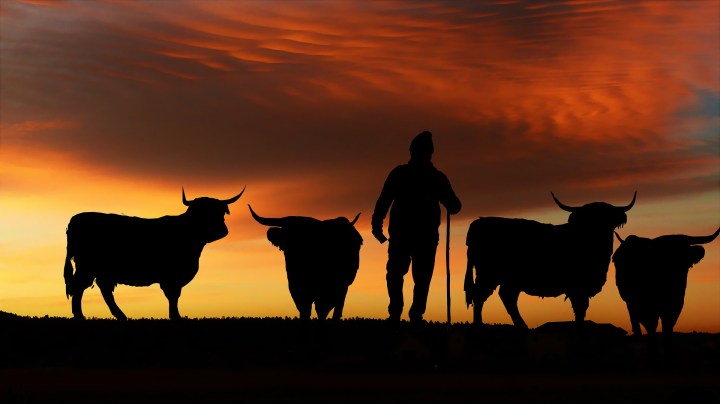CONVERSATION PIECE
What’s the beef with veganism?

Arguments against veganism on environmental grounds are readily found – though not from environmentalists. These arguments often focus on the environmental benefits of livestock farming, sometimes referring to biologist Allan Savory’s ‘holistic management’ of grazing.
If you’re going to take advice about climate change, you could do worse than asking a climate scientist. According to a breezy Fairlady feature, Dr Debra Roberts, a South African who co-chairs the UN’s Intergovernmental Panel on Climate Change (IPCC), says that among the things we can do as individuals to mitigate the climate crisis is to “move towards a plant-based diet”. No wonder – the 2019 Special Report on Climate Change and Land produced by Dr Roberts’ IPCC Working Group says: “A dietary shift away from meat can reduce GHG (greenhouse gas) emissions, reduce cropland and pasture requirements, enhance biodiversity protection, and reduce mitigation costs.”
With a perfectly good South African specialist on the subject, there’s little need, one would think, to turn to anyone else. Yet arguments against veganism on environmental grounds are readily found – though not from environmentalists. These arguments often focus on the environmental benefits of livestock farming, sometimes referring to biologist Allan Savory’s “holistic management” of grazing.
According to Savory’s approach, convincingly argued in a popular TED Talk, the trampling of livestock hooves mimics the natural symbiosis of animals and the landscape, turning desert into fertile land and sequestering carbon in the soil. It’s an approach that’s been soundly debunked in several places, and Savory himself has admitted he’s had trouble replicating results of his original study, which itself has been disputed. A review of over 300 studies shows the potential for carbon sequestration from this method is extremely limited, too.
In South Africa, sports scientist Tim Noakes is one commentator who has referred to Savory’s methods in the past, while in a recent SAFM interview, he claimed, “changing your diet is not going to help climate change. There’s no evidence that a vegan diet is more environmentally friendly than a meat-based diet”. Contrast this with the IPCC’s report that finds that moving towards plant-based diets offer “major opportunities” to address the climate crisis. Dietary changes, it tells us, could decrease pressure on land use to “reduce soil erosion and provide benefits to a range of other environmental indicators such as deforestation and decreased use of fertiliser (nitrogen and phosphorus), pesticides, water and energy, leading to potential benefits for adaptation, desertification, and land degradation”.
Restaurateur and Business Day columnist Andrea Burgener doesn’t quote sources, but it’s certainly conceivable she leans on Savory’s arguments too. She’s not against reducing meat consumption per se, but her recent piece, Going vegan for environment is full of contradictions, aims to show the stupidity of choosing a vegan diet for environmental reasons. “Seventy percent of global agricultural land isn’t fit for crops, but perfect for grazing livestock,” she writes. The reality is that livestock provides just 18% of our calories, but accounts for 83% of agricultural land use, mainly through crops grown for fodder, according to a 2018 study published in the journal Science.
Burgener would like to see livestock fed entirely by grazing, a far gentler and more ecological approach to farming, to be sure. Yet, as The Guardian columnist George Monbiot – someone who’s spent much of his career writing about the environment – states, “as a general model it’s a formula for starvation”. Monbiot goes on to crunch the numbers for the UK scenario: “… all the productive farmland in the UK could be used to support 200m people [on a vegan diet]. By contrast, if [grazing-style livestock] production was applied across all the UK’s farmland, it would supply the UK’s population with around 75 kcal [kilocalories] per person per day – roughly 1/30th of what we need to survive.”
Monbiot is convinced that a vegan can mitigate climate change. His views are supported by a 2018 paper published in Science that studied the environmental impacts of over 38,000 farms. To quote from its findings: “Most strikingly, impacts of the lowest-impact animal products typically exceed those of vegetable substitutes, providing new evidence for the importance of dietary change.” When a 2017 study posed the hypothetical question, what would happen if Americans substituted the beef in their diet for beans, it found that the USA would have been between 43 and 72% of the way to reaching its (long-since abandoned) 2020 emissions goals.
As striking as the confidence with which Burgener and Noakes hold forth on the environment are the sweeping assumptions they both make about those who are making real efforts to change their diets. Noakes thinks “the problem with many vegans is that they think Coca-Cola is vegan and chips are vegan … and so I can eat all of those things”, as if vegans are less capable than meat-eaters of controlling themselves in the sweetie aisle. Burgener calls veganism “bonkers” and paints vegans as unserious fashion victims, too naïve to consider the complexities of food systems and problems of water consumption, monocultures and petrochemical fertilisers to the degree she can.
The environment, animal welfare and health are all good reasons to go vegan. The scaremongering health claims Noakes makes against veganism will have to be refuted elsewhere (although the Physicians Committee for Responsible Medicine is a good place to start), but the cruelty of industrial-scale animal farming is indisputable. And if there are no serious remaining arguments against veganism on environmental grounds, why should anybody be discouraged from trying it? DM






 Become an Insider
Become an Insider